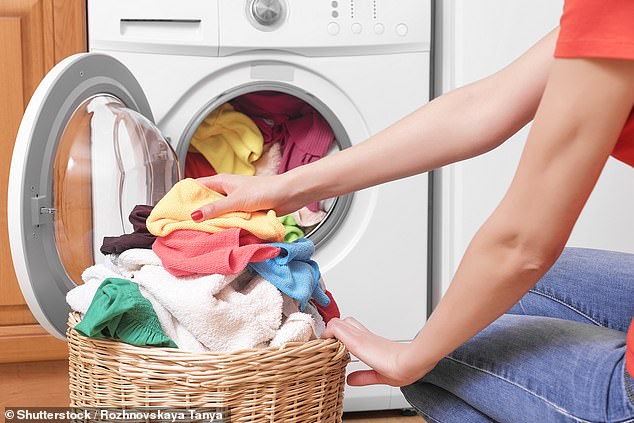Revealed: How Much Having an Adult Child Living at Home Costs You a Year (and How to Get Them Out!)
No rent, food magically appearing in the fridge and laundry done on demand: it’s no wonder some adult children choose to stay in the family home.
But in an alarming trend, more and more young adults feel they have little choice but to live in the family home because the costs of moving are so high.
Rising rent, food and energy costs – not to mention house prices – have made it increasingly difficult to save for a down payment.
As many as 3.6 million people between the ages of 18 and 34 still live at home. According to official data, this is 28 percent of people within this age category.
Adult men are much more likely to share a roof with their father and mother; a third of all men under the age of 34 live at home, compared to about a fifth of women.
Family ties: As many as 3.6 million people between the ages of 18 and 34 still live at home. According to official data, this is 28% of people within this age category
It means millions of parents will have to live with a greater financial burden for longer as they shoulder the extra costs. It can be difficult to start demanding rent after decades of having them under your roof, especially if they’re camping out in their childhood bedroom.
But how much extra does it actually cost to have them at home? How much rent is reasonable and what is the best way to help them get on their own feet?
Money Mail analyzes the figures and asks professional financial planners the crucial questions.
Calculations for Money Mail from Evelyn Partners investment group Bestinvest have shown that parents spend an average of £3,684 a year (£307 a month) extra on energy, food and water bills when there is one adult child living at home.
That equates to an additional cost of £62,628 if their child remains in care from the age of 18 to the age of 34. This rises to £6,252 per year for two adult children living at home (£521 per month).
Alice Haine, personal finance analyst at Bestinvest, says: ‘Of course many parents would welcome the return of their adult children, but they may change their minds when they see their beloved children working their way through the kitchen cupboards, enjoying long, hot showers. and stacking laundry in the washing machine.’
Food is the largest expense. The average monthly food budget for two adults in Britain is £415, according to analysis of official figures by data group NimbleFins.
This includes £320 on groceries and £95 on takeaways and eating out. However, for three adults this rises to £622 per month: £480 on groceries and £142 on prepared food. That is €207 extra per month.
You will also have to deal with higher energy costs. The average annual energy bill is currently £1,690, or £141 per month, according to the Ofgem Energy Price Cap.
A medium-sized home with two to three residents is assumed. However, if one or two adult children return to the family home, costs can rise to £2,365 per year, or £197 per month. That is an increase of €56 per month.

No rent, food magically appears in the fridge and laundry is done on demand – it’s no wonder some adult children choose to stay in the family home
While water bills may vary by region, the number of people living in a home can also have an impact.
According to major water supplier Southern Water, the average monthly bill for a household of two is £34. Add an additional resident and that rises to £44, or £51 for two additional people.
In reality, the total cost of having your children at home could be much higher, says Ms Haine: ‘After all, if someone is part of your daily life, a parent may be tempted to make ad hoc purchases and gifts for their children. to buy. .
“While tapping into the Bank of Mom and Dad by taking advantage of free housing can be financially beneficial to the adult child, it can have a detrimental effect on the parents’ budget and their future savings and investments.”
Parents whose children have left home do not actually expect them to return and may not have budgeted for the additional costs.
Charging rent for an adult child, or a contribution toward bills, can generally be a good idea, Ms. Haine says. But how much?
A survey by Comparethemarket last summer found that more than half of parents charged their children some form of rent for living at home over the age of 18. But instead of actually paying, the payment is more of a symbolic gesture.
On average they paid just €25.55 per week – which equates to €110.71 per month.
This is much lower than the average rent in Britain, which is £1,223 per month, after rising 7.2 percent in the past year, according to property website Zoopla. The highest average rent in Britain is in London, where landlords charge £2,121 per month, while the North East has the lowest monthly rent at £695.

Parents were found to spend an average of £3,684 extra each year on energy, food and water bills with one adult child living at home
While you could technically charge the going rent in your area, that may not be wise because it could hinder your child’s ability to save and eventually move.
Ms Haine says: ‘A rent that just covers the financial burden of having an extra person in the home should not be so burdensome that it delays their ability to save, move and live independently.’
You can calculate the additional costs yourself by monitoring any increases in your bills and the costs of the weekly groceries.
Alternatively, you can charge £307 per month, which Ms Haine says should cover the extra costs for energy, food and water.
According to the Office for National Statistics, a home is considered ‘affordable’ if you spend 30 percent or less of your income on rent. This means that charging your adult children 15 percent of their income would give them the financial room to save, says Ms. Haine.
“As a general formula, you shouldn’t charge anywhere near the average rent in your area, but you should ask them to cover at least the basic costs,” she adds.
But if parents want to accelerate their child’s savings trajectory, it would be more preferable to charge 10 percent of their child’s income, provided this is enough to cover the parent’s cost of getting the child home to cover, she adds.
You could charge them nothing at all, but adults who have received significant financial help from the Bank of Mum and Dad are more likely to still live with their parents, according to a study by investment group Wealthify.

Sticky sons: Adult men are much more likely to share a roof with their father and mother – a third of all men under 34 live at home, compared to about a fifth of women
They are also more likely to make impulse purchases and avoid looking at their bank balance, with the extra financial support typically making them less savvy with their own money. They are also less likely to have an emergency savings fund.
Michelle Holgate, a financial planner at asset manager RBC Brewin Dolphin, says it can be useful to have adult children pay certain bills if they hope to buy a house. “Creating accounts in their name will increase their credit score and can increase their chances of getting a mortgage,” she says.
However, you should assess their financial situation before asking them to contribute large amounts, she adds. For example, consider whether they have debts and need to prioritize repayments.
Neil Rayner, head of advice at financial adviser True Potential, says parents can set aside their children’s rent payments to use towards a home deposit.
‘If I invest £450 a month in shares and the Isa returns 6 per cent a year, that would mean they could have £31,553 in just five years – enough for a deposit on an average house,’ he says. ‘This is a win-win situation as it can get your children onto the property ladder.’
If your child has a higher income, you may be tempted to charge more rent. But Ms. Haines warns against this, especially if you have multiple children.
She says: ‘You should always treat your children equally and ask for an affordable amount. Don’t punish one of them for making more money by charging more rent. Charge them enough that they can pay the bills, but not so much that their savings prospects suffer.”
- Does your adult child still live at home? Tell us what you charge, at j.beard@dailymail.co.uk
Some links in this article may be affiliate links. If you click on it, we may earn a small commission. That helps us fund This Is Money and keep it free to use. We do not write articles to promote products. We do not allow a commercial relationship to compromise our editorial independence.
